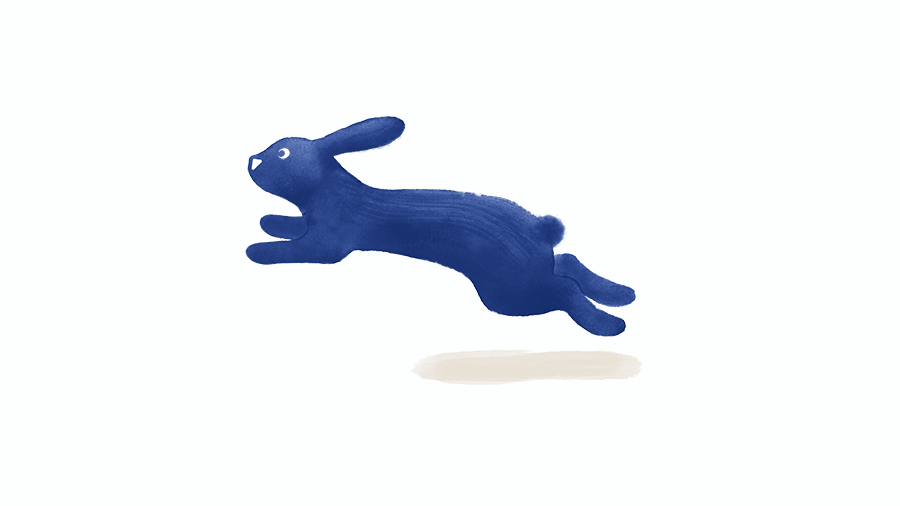Looking After Your Rabbit's Teeth
Dental disease is really common in rabbits and often tied to their diet, so keeping their food just right is very important. With a few simple tips you can make sure your rabbit’s diet stays healthy and keeps dental problems at bay.
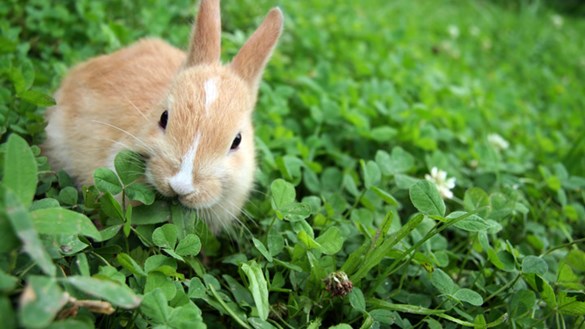
Understanding your rabbit’s dental health
Your rabbit has a unique dental makeup which affects their dental health. They’re born with rooted teeth which grow continuously throughout their life, sometimes by as much as 12cm a year. It’s why a high-fibre diet rich in hay and plenty of chewing opportunities is essential for keeping them healthy. The constant chewing helps wear their teeth down and prevents problems caused by overgrowth.
Dental disease is very common in rabbits as they have small mouths and can become easily stressed. They’re also very good at hiding when they’re in pain or discomfort, so regular vet checks are crucial.
What’s inside your rabbit’s mouth?
Your rabbit has 28 teeth in total – 16 on top and 12 on the bottom. Of those 28, 24 are cheek teeth while they have four sharp incisors at the front. They play a vital part in their whole digestive system, helping to break down food like hay and fibrous materials that other animals can’t. They use their molars at the back of the mouth to help grind down food.
The two top incisors (maxillary incisors) are shorter than the ones on the bottom (mandibular incisors). They also have grooves on the front (labial) surface. Rabbits don’t have canine teeth. Instead, their teeth are cylindrical and curve as they grow. They also have a set of smaller peg teeth that sit just behind the larger set of incisors.
Interestingly rabbits have a blind spot directly in front of their mouth and rely on sensitive whiskers (vibrissae) on their lips to find food!
Unlike humans, or indeed dogs and cats, they don’t have baby teeth. Rather, they’re born with adult teeth that grow continuously throughout their life and are constantly being worn down and renewed.
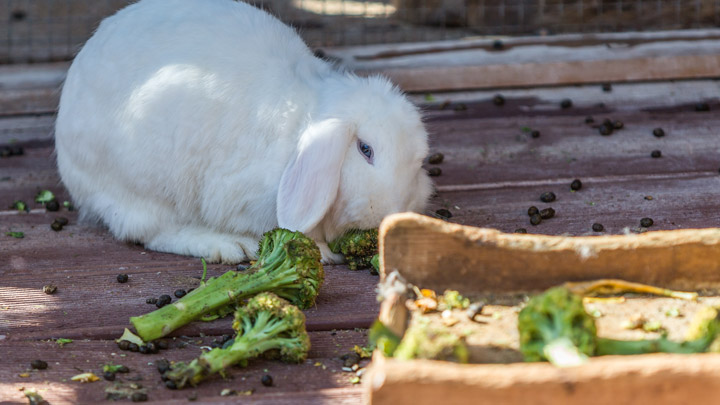
Caring for your rabbit’s teeth
Your rabbit’s unique dental structure means regular care is essential. Without it, they’re at much greater risk of dental disease which can cause a range of painful and serious issues such as overgrown teeth, tooth spurs, abscesses and infections, weight loss and behavioural changes.
Regular check-ups with your vet are a must, as is a diet rich in fibre with plenty of chewing opportunities. Give them unlimited access to Timothy hay and grass to keep their teeth in good condition.
The right diet for your rabbit’s teeth
The best way to keep your rabbit healthy is by offering a varied diet of the right foods:
- Unlimited fresh hay – This is essential for helping them to grind down their teeth. Timothy, meadow, orchard or oat hay are all ideal
- Fresh leafy greens – Romaine lettuce, kale, bok choi, watercress, kohlrabi, beetroot greens and broccoli greens are all great choices for your pet
- High-quality rabbit pellets – Look for pellets high in fibre and low on fillers. Only offer a small amount or it may reduce the amount of hay they eat
- Limited treats – Occasionally let them have small pieces of carrot or apple. Avoid sugary fruits and processed sweets which can affect their overall and dental health
- Fresh water – Always give access to fresh water to keep them hydrated and aid digestion
Find your nearest practice
Causes and prevention of dental disease
The main cause of dental disease is an overgrowth of the front teeth, usually down to a lack of hay and fibrous foods. This can result in sharp, misaligned teeth which can lead to painful conditions like tooth spurs and abscesses.
If your rabbit’s diet is poor, they may also suffer from a calcium deficiency which weakens their teeth and make dental disease more likely. Injuries to the teeth or jaw can also impact their oral health, making it difficult to eat and affecting the way the teeth wear down.
Regular dental checks will help you stay on top of your rabbit’s dental health and catch problems early on.
Signs of dental problems
Rabbits are really good at masking when they’re in pain so it’s often hard to tell if something is wrong. Overgrown teeth can dig into the soft tissue of the mouth causing pain and preventing proper chewing. In severe cases, dental disease can lead to tooth abscesses, extraction, anorexia and even death.
It’s important to keep a close eye or your pet for any signs they might be in discomfort. These can include:
- Reduced appetite, lost appetite or picky eating
- Weight loss
- Drooling
- Difficulty eating or chewing
- Changes in behaviour such as becoming lethargic or hiding
- Facial swelling or bumps on the face and jaw
- Snuffles, sneezing or nasal discharge
- Reduced amount of droppings
- A lack of grooming
If you’re concerned, take your pet to the vet for a check-up.
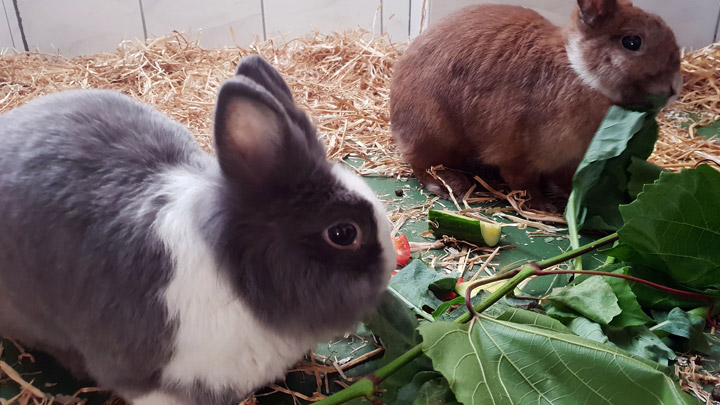
Malocclusion
Sometimes your rabbit’s teeth are misaligned and don’t meet properly which can cause them to grow abnormally. The natural wearing down process doesn’t happen causing overgrowth and trouble eating.
There are several causes of malocclusion. Certain breeds like dwarf or lop ear rabbits are more prone to it because of jaw structure and inherited characteristics. If your rabbit suffers a trauma or injury to their face, it can also cause misalignment while a diet low in fibrous materials like hay can contribute to malocclusion over time.
Overgrown teeth
Prevent overgrown teeth by making sure your rabbit has a diet rich in hay and other fibrous, leafy greens which help promote natural wear and tear.
If they do suffer from overgrown teeth your vet may be able to trim them to prevent pain. Sometimes tooth extraction is the best option and your vet will talk to you about what’s right for your rabbit.
Treatment of dental disease
Your vet will carry out various procedures to treat dental disease such as trimming.
To trim the teeth, they’ll use a dental burr to file them down – this is usually a painless procedure and your rabbit won’t need sedation. However, it may need to be repeated every few weeks. Sometimes your vet will have to file the teeth down or perform an extraction under general anaesthetic to make it as stress-free as possible for your rabbit.
If your vet has an abscess this may need to be drained and cleaned. Your vet may also give your rabbit pain relief and antibiotics to treat any infection. Abscesses in rabbits can be challenging and may reoccur so it’s important to monitor your pet and see your vet for any follow-ups.
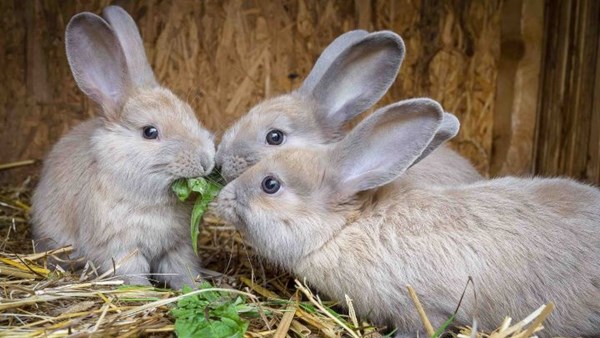
Rabbit Care Guide
Keep your rabbit healthy and happy with our essential guide. While there’s no perfect way to care for all rabbits because each rabbit and situation is different, we’ve put together a comprehensive guide to provide you with the basics of caring for your pet.
Learn more

Our Healthcare Plan For Your Rabbit
With the Medivet Healthcare Plan, you can save up to £170 each year and that’s without discounts that the plan offers on top.
Learn more


